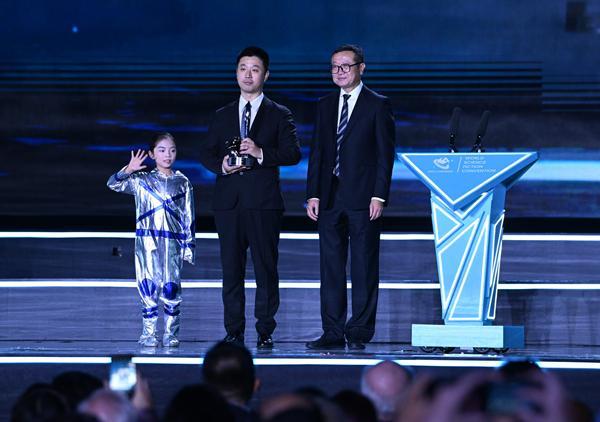Keep your job, but find time to write your story
 0 Comment(s)
0 Comment(s) Print
Print E-mail China Daily, October 26, 2023
E-mail China Daily, October 26, 2023

Chinese sci-fi writer Hai Ya receives the Best Novelette award from Liu Cixin, China's predominant sci-fi writer, at the Hugo Awards ceremony held in Chengdu, Sichuan province, Oct. 21, 2023. [Photo courtesy of Chengdu Worldcon]
Science fiction lovers in China have reason to feel inspired by Chinese writer Hai Ya, whose book The Space-Time Painter won the Hugo Award for Best Novelette on Saturday. It is considered one of the most prominent awards in this genre. Besides, he is the third Chinese writer to win a Hugo award after Liu Cixin in 2015 and Hao Jingfang in 2016.
Hai has also impressed the world with his work ethics. Reports quoted him as saying that after the awards night in Chengdu he would fly back to Shenzhen on Sunday night, so as not to miss work on Monday. He works in a bank.
Rather than being a full-time novelist, Hai treats writing as a part-time activity to be taken up whenever he is not doing his bread-winning job, something that should inspire more young writers. There was a time when not everyone could be a "writer" but now more and more people are pursuing their dreams to become writers.
In fact, Liu Cixin, who won the Hugo Award for The Three-body Problem, is also a part-time writer, holding an engineering job. He encourages young people to keep their jobs and write if they have dreams.
Their stories go to show that holding a job should not deter people from pursuing their dreams of writing. If there is a story and the will to write it, one can get up early or sleep late to devote around three hours to writing intensively every day. And having a job will actually equip one with enough material to write about, while the salary can guarantee a life, because not every writer makes enough money from writing.
The key lies in balancing the eight hours one spends in office every day with three hours of writing in the early morning or late at night. Persistence is the key.





